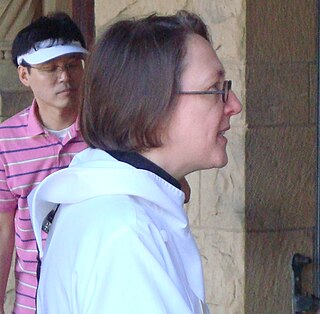The history of science and technology (HST) is a field of history that examines the development of the understanding of the natural world (science) and humans' ability to manipulate it (technology) at different points in time. This academic discipline also examines the cultural, economic, and political context and impacts of scientific practices; it likewise may study the consequences of new technologies on existing scientific fields.

Michael Polanyi was a Hungarian-British polymath, who made important theoretical contributions to physical chemistry, economics, and philosophy. He argued that positivism is a false account of knowing.

The University of Manchester is a public research university in Manchester, England. The main campus is south of Manchester City Centre on Oxford Road. The university owns and operates major cultural assets such as the Manchester Museum, The Whitworth art gallery, the John Rylands Library, the Tabley House Collection and the Jodrell Bank Observatory – a UNESCO World Heritage Site. The University of Manchester is considered a red brick university, a product of the civic university movement of the late 19th century. The current University of Manchester was formed in 2004 following the merger of the University of Manchester Institute of Science and Technology (UMIST) and the Victoria University of Manchester. This followed a century of the two institutions working closely with one another.

Dick Taverne, Baron Taverne, is a British politician and life peer who served as Member of Parliament (MP) for Lincoln from 1962 to 1974. A member of the Liberal Democrats, he was a Labour MP until his deselection in 1972, following which he resigned his seat and won the subsequent by-election in 1973 as a Democratic Labour candidate.

Clifford Edmund Bosworth FBA was an English historian and Orientalist, specialising in Arabic and Iranian studies.
Charles William John Withers, is a British historical geographer and academic. He has been the Geographer Royal for Scotland since 2015, and held the Ogilvie Chair of Geography at the University of Edinburgh from 1994 to 2019.

Jane Alison Shaw is a British historian of religion, Anglican priest and academic. She is principal of Harris Manchester College, Oxford, Professor of the History of Religion, and pro-vice-chancellor at the University of Oxford. Previously she was Professor of Religious Studies and Dean of Religious Life at Stanford University and Dean of Grace Cathedral in San Francisco.
The Folklore Society (FLS) is a registered charity under English law based in London, England for the study of folklore. Its office is at 50 Fitzroy Street, London home of the Royal Anthropological Institute of Great Britain and Ireland.

Dame Janet Laughland Nelson, also known as Jinty Nelson, was a British historian and professor of Medieval History at King's College London.

George Sebastian Rousseau is an American cultural historian resident in the United Kingdom.

Robert Garner is a British political scientist, political theorist, and intellectual historian. He is a Professor Emeritus in the politics department at the University of Leicester, where he has worked for much of his career. Before working at Leicester, he worked at the University of Exeter and the University of Buckingham, and studied at the University of Manchester and the University of Salford.

Deborah Harkness is an American scholar and novelist, best known as a historian and as the author of the All Souls Trilogy, which consists of The New York Times best-selling novel A Discovery of Witches and its sequels Shadow of Night and The Book of Life. Her latest book is The Black Bird Oracle, a sequel to the All Souls Trilogy.

Harris Manchester College (HMC) is one of the constituent colleges of the University of Oxford in the United Kingdom. It was founded in Warrington in 1757 as a college for Unitarian students and moved to Oxford in 1893. It became a full college of the university in 1996, taking its current name to commemorate its predecessor the Manchester Academy and a benefaction by Lord Harris of Peckham.
Alexandra Marie Walsham is an English-Australian academic historian. She specialises in early modern Britain and in the impact of the Protestant and Catholic reformations. Since 2010, she has been Professor of Modern History at the University of Cambridge and is currently a fellow of Emmanuel College, Cambridge. She is co-editor of Past & Present and vice-president of the Royal Historical Society.

Roy Malcolm MacLeod is an American-born historian who has spent his career working in the United Kingdom and Australia. He is a specialist on the history and social studies of science and knowledge.
Patricia E. Skinner, FRHistS is a British historian and academic, specialising in Medieval Europe. She was until August 2020 Professor of History at Swansea University. She was previously Reader in Medieval History at the University of Winchester and Lecturer in Humanities at the University of Southampton. She has published extensively on the social history of southern Italy and health and medicine. With Dr Emily Cock, she started the project "Effaced from History: Facial Difference and its Impact from Antiquity to the Present Day" to study the history of facial disfigurement.
Bruce Mortimer Stanley Campbell, FBA, MRIA, MAE, FRHistS, FAcSS is a British economic historian. From 1995 to 2014, he was Professor of Medieval Economic History at Queen's University Belfast, where he remains an emeritus professor.

Social Histories of Medicine is a book series from Manchester University Press which covers "all aspects of health, illness and medicine, from prehistory to the present, in every part of the world". It runs in collaboration with the Society for the Social History of Medicine and is the third series that the society has been associated with after Studies in the Social History of Medicine (1989-2009) and Studies for the Society for the Social History of Medicine. The editors of the current series are David Cantor and Keir Waddington.
Waltraud Ernst is a German professor of the history of medicine at Oxford Brookes University. She is a specialist in the history of psychiatry.












